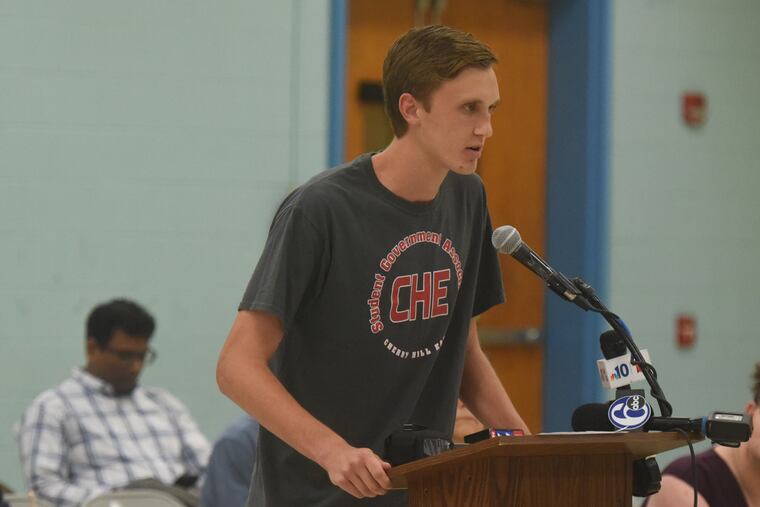Cherry Hill schools chief says changes planned for controversial unpaid meals ‘tuna proposal’
Faced with mounting public pressure, Cherry Hill schools Superintendent Joseph Meloche announced Tuesday that the district plans to revise its controversial overdue lunch fees policy that gives tuna sandwiches to students who owe $10 and stops serving those with a $20 debt.

Faced with mounting public pressure, Cherry Hill school superintendent Joseph Meloche announced Tuesday that the district plans to revise its controversial overdue-lunch-fees policy that gives tuna sandwiches to students who owe $10 and stops serving those with a $20 debt.
The announcement came two weeks after the South Jersey district touched off a debate about lunch shaming. At that meeting, assistant superintendent Lynn Shugars asked the board to tweak what has become known as “the tuna policy.” She said the district should begin following a provision in its long-standing unpaid meal policy that mandates those who owe $20 or more will get no lunch until the debt is paid.
The recommendation was widely criticized in some circles and local officials vowed to block it from taking effect. Assemblywoman Pamela Lampitt (D., Camden), who represents Cherry Hill, plans to introduce a bill this year in Trenton that would prohibit districts from denying a meal to a student because of a delinquent meal account.
In an emotional appeal to the school board Tuesday night, Oliver Adler, Cherry Hill High School East student body president, said he was horrified by what has come to be known as the “tuna proposal” and urged the board to reject it.
The “easily recognizable tuna fish sandwich," he said, “will become a badge of shame.”
“What the board may fail to recognize is that school cafeterias are not always friendly places, and students will be stigmatized,” Adler said. “Meal options, like other things, document status.”
School board members suggested ways to change the policy: increasing the threshold to $25 when parents are notified and $60 when students are no longer served; eliminating the alternate meal; and accepting donations.
Board member Laurie Neary said the district should push lawmakers to change state regulations to allow more flexibility.
Meloche told the crowd of about 60 people that school officials would consider the recommendations and present a revised policy on Sept. 10. He gave no indication on what changes would be made.
“We realize that there are things in the policy that need to be redone, that we need to work on, that we need to talk about and have a discussion as a board and a community,” Meloche said. The district, one of the largest in the area, enrolls about 11,000 students. About 20% are eligible for reduced-price or free meals.
In a joint statement Tuesday, Cherry Hill Mayor Chuck Cahn and Council President David Fleisher and council members opposed the proposal. “A policy that restricts or limits a child’s access to food is not right — and is simply unacceptable,” Cahn said.
Added Fleisher: “As a community, we must be sure that our children remain fed and protected.”
Some have blasted the proposal as punishing children whose parents may be unable to pay. Similar charges have been made recently in other districts around the country.
“Essentially, public shaming of students must be deemed unacceptable in any New Jersey school,” Adele LaTourette, director of Hunger Free New Jersey, said in a statement Tuesday. Her group wants the state to provide funding for reduced-price meals, which essentially would make more students eligible for free meals.
After a public outcry, a Northeastern Pennsylvania district reversed its threat to try to place children whose parents had not paid their school-lunch bills in foster care. The Wyoming Valley West School District agreed to the donation of a Philadelphia businessman to clear the $22,467 lunch debt.
In Cherry Hill, Shugars cited a $14,343 meal debt incurred by about 343 students. She said parents were notified repeatedly but have not paid the fees. In the previous school year, the district wiped out about $25,000 in unpaid meal fees, she said.
According to Shugars, the $3 million meal program is self-sustaining and covers expenses for food, salaries, benefits, and equipment. She said she worries that others will stop paying if the district doesn’t enforce the policy. For the upcoming school year, lunch at the elementary and middle schools will cost $3, and $3.10 for the high schools.
Under the current lunch policy, adopted in 2017, students with an outstanding balance of more than $10 get an “alternate” meal. That meal includes a tuna sandwich on wheat bread and a meal that meets U.S. Department of Agriculture standards with milk or juice, carrots or cucumbers, and fruit. About 60 tuna sandwiches were served every day as an alternate meal last year, Meloche said.
Board member Carol Matlack said the district should eliminate the alternate meal for students who owe money and give those students the meal of the day that other students receive. Board member Ruth Schultz said the district must find a way to balance providing meals with meeting its financial obligations.
“This is a difficult conversation,” Schultz said.
Cherry Hill, which has about 70,000 residents, is no longer the predominantly affluent community of the ’60s, and there are some with financial hardships that spill over in the schools, said board member Ben Ovadia. “Food insecurity is real.”
There have been offers from residents and strangers from around the country to clear up the outstanding debt. But the district has said it would not accept donations from its foundation or others. The district said it believes some parents with delinquent accounts have the financial ability to pay.
Meloche said about $3,000 has been collected since the district announced it may begin strictly enforcing the unpaid fees policy. He said school officials are willing to work with families to wipe out the lunch debt.